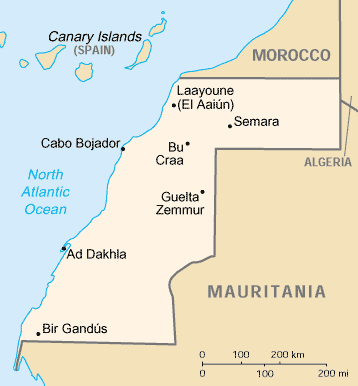 Sahara's situation is the opposite. There is very little territory controlled by a self-declared Western Sahara, but as a country it has quite a lot of recognition. Quite a few African and Third World countries maintain diplomatic relations with the SADR, and the idea that there ought to be a Western Sahara is one that retains a lot of support (or lip service) beyond those who formally recognise the SADR. If you look at a world atlas, there is a good chance that Western Sahara will be shown as an independent country, even if it does not exist in any real sense.
Sahara's situation is the opposite. There is very little territory controlled by a self-declared Western Sahara, but as a country it has quite a lot of recognition. Quite a few African and Third World countries maintain diplomatic relations with the SADR, and the idea that there ought to be a Western Sahara is one that retains a lot of support (or lip service) beyond those who formally recognise the SADR. If you look at a world atlas, there is a good chance that Western Sahara will be shown as an independent country, even if it does not exist in any real sense.So what is this Western Sahara? In the colonial period, it was an Atlantic coast possession of Spain, gaining its rather unimaginative name from its being at the western end of the Sahara desert. As the wind of change blew through Africa, an independence movement emerged in the region, calling itself POLISARIO. In 1975, Spain withdrew from the territory, but by prior agreement it was immediately invaded by Mauritania and Morocco, who carved it up between them. POLISARIO launched a guerrilla war against both of them, with the support of Algeria. Their struggle had the implicit support of the International Court of Justice, which had ruled that the people of the territory were entitled to self-determination.
Initially, POLISARIO's war went well. Mauritania found the going particularly hard. A change of regime there led to Mauritania withdrawing from Western Sahara in 1979 and recognising the rights of the Saharawi Arab Democratic Republic that POLISARIO had declared in 1976. Morocco, however, simply extended its zone to include as much of the Mauritanian territory as it could. Militarily, the Moroccans were able to turn the tables on POLISARIO by fortifying the parts of the country that had the towns and mineral resources, leaving the rebels only with empty desert. At this point the war stalemated, and a ceasefire was agreed in 1991.
 The 1991 ceasefire was meant to be the prelude to a settlement of the dispute, but instead it has frozen the conflict. 1992 was meant to see a referendum on whether the territory would join Morocco or become independent; this vote has never taken place, largely because of disputes over who would get to vote in it. The continuing stagnation favours the Moroccan regime, as it has been able to entrench its rule over the territory. It is very hard to see why it is worth POLISARIO's while engaging with this farcical non-peace process, yet if they return to arms, they will most likely be cast as the bad guys who are against peace. The Moroccan regime has also played the Western powers astutely – during the Cold War, they could not be pressured over the Western Sahara, for fear of strengthening the communists, and now it is vital that Morocco control the territory to prevent an al-Qaida take-over there (or in Morocco itself).
The 1991 ceasefire was meant to be the prelude to a settlement of the dispute, but instead it has frozen the conflict. 1992 was meant to see a referendum on whether the territory would join Morocco or become independent; this vote has never taken place, largely because of disputes over who would get to vote in it. The continuing stagnation favours the Moroccan regime, as it has been able to entrench its rule over the territory. It is very hard to see why it is worth POLISARIO's while engaging with this farcical non-peace process, yet if they return to arms, they will most likely be cast as the bad guys who are against peace. The Moroccan regime has also played the Western powers astutely – during the Cold War, they could not be pressured over the Western Sahara, for fear of strengthening the communists, and now it is vital that Morocco control the territory to prevent an al-Qaida take-over there (or in Morocco itself).One possible glimmer of hope for the plucky Western Saharans was the outbreak in 2005 of disturbances within the Moroccan controlled areas of the territory. This "Independence Intifada" suggests a possible third course of action, between rolling over and accepting Moroccan rule or relaunching the war. At the same time, the balance of forces against Western Sahara is so strong that it is hard to see anything good happening there, unless major changes occur within Morocco itself.
Pictures from Wikipedia

3 comments:
Thanks for bringing some publicity to this little known conflict. The controversy over who should vote in any referendum is about giving to, or withholding a vote from, the numerous settlers brought in by Morocco (give them a vote?; get them out!). Spain ,of course, has played a disgraceful role.
I think yo waste your time by writing all those lines for something that doesn't exist.. This Sahara & all it's cities is Moroccan under the draft of "Kingdom of Morocco".
Mouhssine DSM
But it may one day exist, and even if it does not, many people would like it to now, and it already has much of the trappings of a sovereign state (albeit without the sovereignty).
Post a Comment